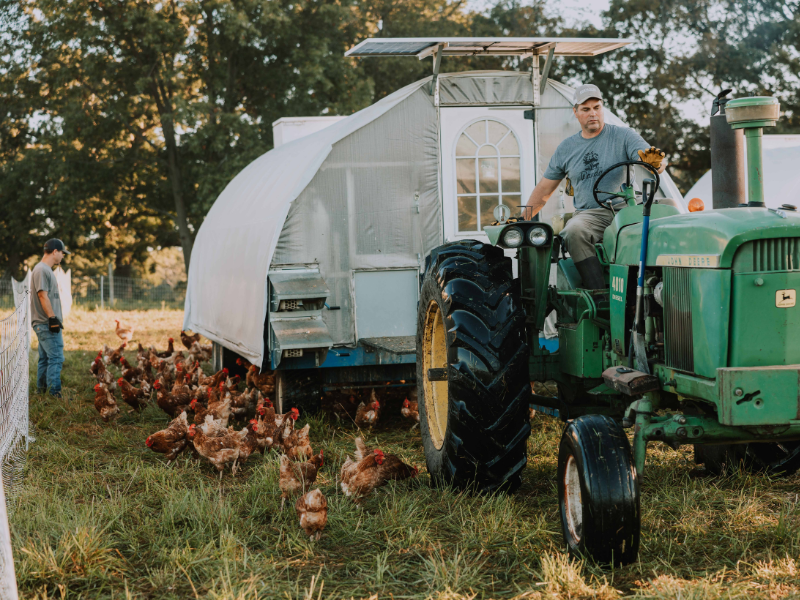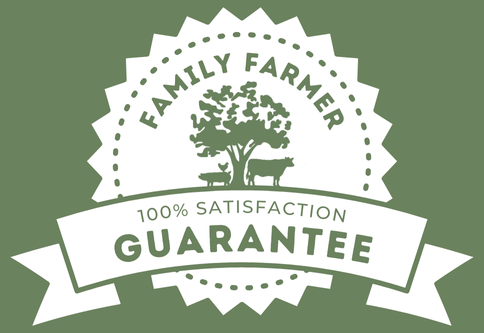A buttery ribeye infused with rosemary.
Or Sunday-morning bacon, maple-kissed and golden-edged. And not without plenty of butter and eggs on the side.
All of these are indulgences I love… and that I’m sure you love as well.
Even more so because these foods are good for you…
Giving your body so much strength and vitality.
But you know what… plot twist.
All of those people who say fatty steaks and eggs are the villain, and will cause such and such diseases, may actually be RIGHT.
Fat is the worst thing you can eat if you’re trying to be healthy—under ONE condition…
But before I get into that…
Why is it that so many people made the decision to incorporate nutrient-dense meats and eggs (including lots of fat) in their diet?
Why Fat Is Essential for Health.
Fat is the body's preferred source of fuel (especially when on a low-carb diet). Your body uses it much more efficiently than both carbs and sugar… (no energy crashes or mood swings.)
Some vitamins NEED fat for your body to absorb them… like vitamins A, D, E, and K, which are fat-soluble, meaning you literally can’t absorb them without fat present… So even if you’re eating liver (vitamin A) or greens (vitamin K), those nutrients are pretty much USELESS without enough fat to carry them into your cells.
The cholesterol in fat is the raw material that produces hormones like testosterone, estrogen, and cortisol (responsible for maintaining constant blood pressure and blood glucose levels, and regulating immune function and anti-inflammatory mechanisms) in your body. Low fat = a starving endocrine system… which tanks your mood, libido, and metabolism over time.
Every cell in your body has a fatty membrane… and your brain? It’s made up of roughly 60% fat (mostly DHA and other fatty acids). This means not eating fat is basically starving your cells and brain—your operating system.
All unnecessary cravings go away because of the way fat satiates your body (it slows digestion, stabilizes blood sugar, and keeps you full)... without it people tend to snack throughout the day, crave and binge carbs, and lose control of knowing when their body is actually hungry.
Fat is the key that allows your body to thrive and prosper.
(Even if you love to eat veggies!! Because many of the important nutrients in veggies are fat-soluble… meaning your body can’t absorb them without fat present.)
So what makes fat so bad?
Well firstly, not ALL fat is the same. Some fat may be detrimental to your health. While other fat can heal your body in the most marvelous ways.
This is because of one important thing:
Toxins are stored in the fat.
In fact, some toxins love fat… due to being lipophilic. (Meaning they dissolve in fat.)
Although some toxins—like bentazone, glyphosate, imidacloprid, fluoride, and arsenic—are hydrophilic, meaning they dissolve in water (and don’t store in the fat).
So just like any packaged snack at the grocery store, low-quality fat may have hidden mystery ingredients… i.e. toxins, inside it. (Remember: not ALL toxins are stored in the fat… but most of the persistent and harmful ones are—especially the ones conventionally-raised livestock are exposed to.)
Because, whenever an animal is exposed to harmful substances/toxins… like pesticides, herbicides, heavy metals, antibiotics, or mold toxins—whether that’s through the food they eat, or the water they drink, or the air they breathe… Those compounds don’t just vanish into thin air. (Or don’t just turn into a cow-patty lol.)
They have to go somewhere. That “somewhere” being the fat of the animal.
But really, it’s all by design. Because shoving all those toxins into fat cells keeps them away from vital organs—it’s the body’s version of sweeping junk under the rug. But with one problem: those toxins stay there.
So which toxins accumulate in fat (and how’d they get there)?
Dioxins and furans (PCDDs/PCDFs) — These are toxic compounds created when industrial waste, plastics, or chemicals are burned… think incinerators, factory emissions, or even backyard trash fires. They don’t break down easily and are known to bioaccumulate in fat—making them one of the most persistent and dangerous pollutants in the food chain. So how do they end up being consumed by livestock? These toxins settle onto grass, soil, and water—which grazing animals like cows eat directly or ingest through contaminated feed (like grain) or hay.
Pesticides and herbicides — Banned chemicals like DDT can still be found in soil today (both the soil which livestock may live on and the soil their feed—mainly grains for most—is grown on)… in addition to other modern pesticides—like organophosphates and organochlorines. If an animal was fed feed grown with pesticides, its residues can end up in its fat… and then on your plate, and then in your body.
PCBs (Polychlorinated Biphenyls) — These man-made chemicals were once used in everything from paints and coolants to glues and electrical equipment. Even though PCBs were banned in 1979, they’re still found in soil, water, and—yep—animal fat. Their ability to stick around for decades means they often show up in conventionally-raised meat, through feed, water, or soil contamination—when ingested, they circulate in the animal’s bloodstream and get stored preferentially in adipose (fat) tissue, especially in fattier animals like pigs.
Toxic heavy metals — Some metals like mercury, lead, cadmium, and even aluminum accumulate in fat… and these aren’t just neurotoxic—they disrupt hormones, impair detox pathways, and increase oxidative stress. Chronic exposure (even in small amounts) accumulates over time. Animals ingest them via contaminated soil, water, or feed, especially if raised near urban or industrial zones (for example, lead and cadmium can enter through plants or grains grown in polluted soils).
These are the most prominent toxins that end up being in the fat of most conventionally raised animals. And the reason why SOME fat causes many health issues.
By “SOME fat” I mean fat from conventionally raised animals (including cattle, pigs, chickens…) which are exposed to these toxins persistently… and NOT fat from animals raised with good practices. (And these toxins don’t ONLY end up in the fat of the meat you consume… they end up in the dairy—like milk, cream, and butter—and egg yolks produced by these animals too… which are made up of fat.)
So although short-term you might see results sticking to conventionally raised, grain fed meats and eggs (with toxins accumulated in the fat)—simply because some of the benefits of those meats and eggs are still present…
Long-term it is not the solution to feel your very best and be TRULY healthy.
Because slowly but surely, those same toxins will accumulate in your body (and in your fat).
The Problem with Toxins in Fat.
If someone is relatively new to a fat based diet, with lots of meat and eggs, then they may in fact feel good, and think nothing is wrong… but that’s only because the amount of toxins is so small. As time passes, these toxins will slowly accumulate until they cause your body serious harm, which may include:
Fatigue, headaches, brain fog, anxiety and depression…
Digestive problems, leaky gut, histamine responses, bloating and inflammation…
Increased risk of cancer, cardiovascular disease, liver damage, obesity…
Hormone imbalance, mast cell overreaction, trouble sleeping, skin conditions…
Or more.
Simply because these toxins DO NOT belong in your body. (And the animals' bodies, and anywhere to be honest…)
This is exactly why WHERE and HOW your food was raised is so important, and why I as a farmer stress food quality so much…
Because when you buy food from a farm that PROPERLY raises its animals and takes good care of its land…
It makes the difference between you being actually healthy and feeling like your true, abundant self… instead of having loads of unwelcome and unnecessary health issues.
This is exactly why Wanda Farms has extensively audited our practices to make sure there is no toxin build-up in the fat of our animals.
To ensure you’re eating quality fat, from the best possible source, with NO toxins.
That is TRULY the best for your body and soul, and your family’s.
How this is possible. (And how regenerative farming solves this problem.)
Our regenerative farm is 60+ miles away from any major cities—out in nature, away from toxin-exposure, where the land is pristine and untouched (sounds like a fairy-tale right? lol).
One reason why we practice regenerative farming—which includes NEVER ever spraying any glyphosate, pesticides, or herbicides on our soil—is because that preserves the quality of our soil, thus allowing our soil to have a high microbe count. And guess what? The microbes in quality soil actually break down any toxins that may be present in the soil.
And our animals only eat the best quality food, and are given NO hormones, NO steroids and especially NO mRNA vaccines…
And NONE of our products have junk like nitrates/nitrites, GMOs, additives, fillers, MSG, etc.
Our cattle graze our lush pastures, and eat only grass year-round, even in the winter (we make our own hay from our grass to feed in the winter.)
Our omnivorous chickens and hens love to “hunt” for beetles, grasshoppers, ants, spiders, worms; and snack on clover, alfalfa, dandelion, and wild plants.
Our hogs root around with their snouts for wild plants and grubs like roots, tubers, and bulb; and snack on grasses, clover, herbs, weeds, and the occasional acorns falling from the trees high above. Anything they can find.
Why do we do this?
Because we want you to feel, be, and look your best, and be the healthiest you possibly can be in a world where it’s hard to find REAL food.




